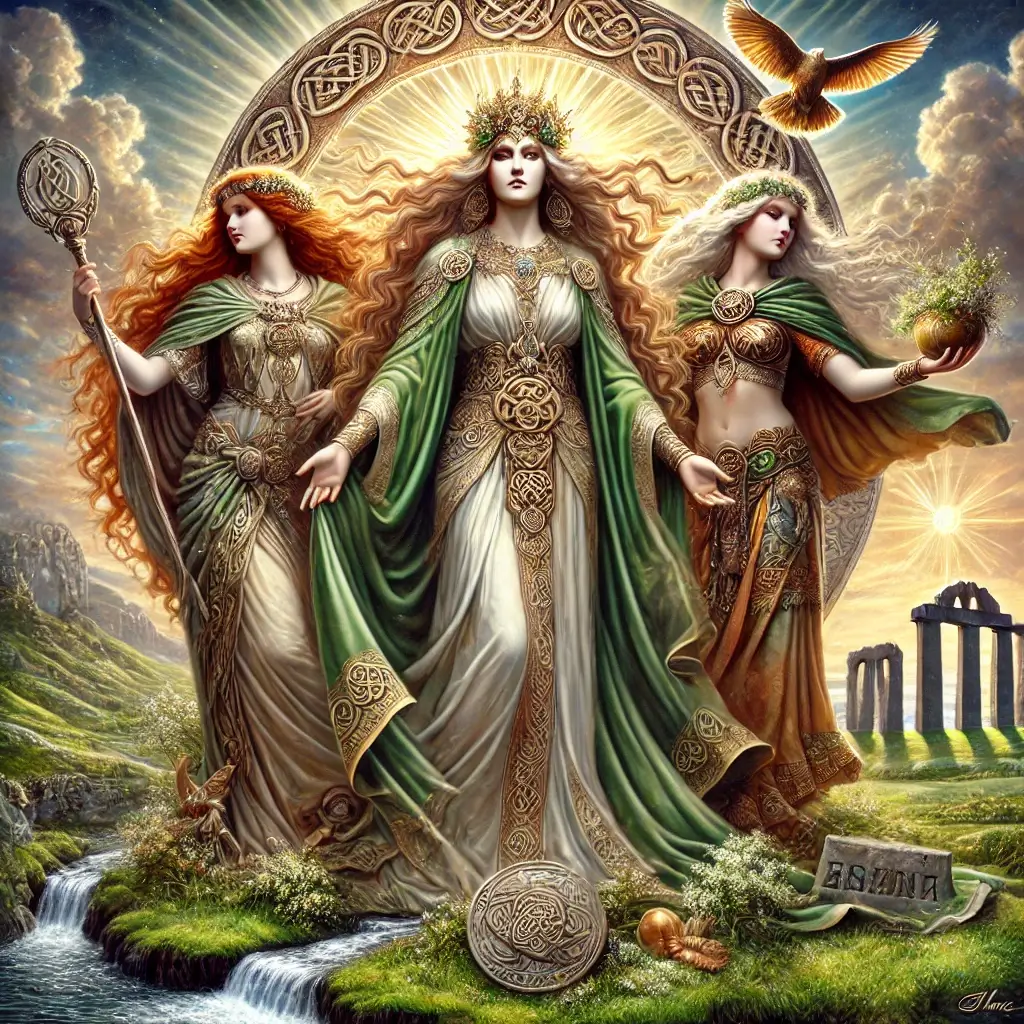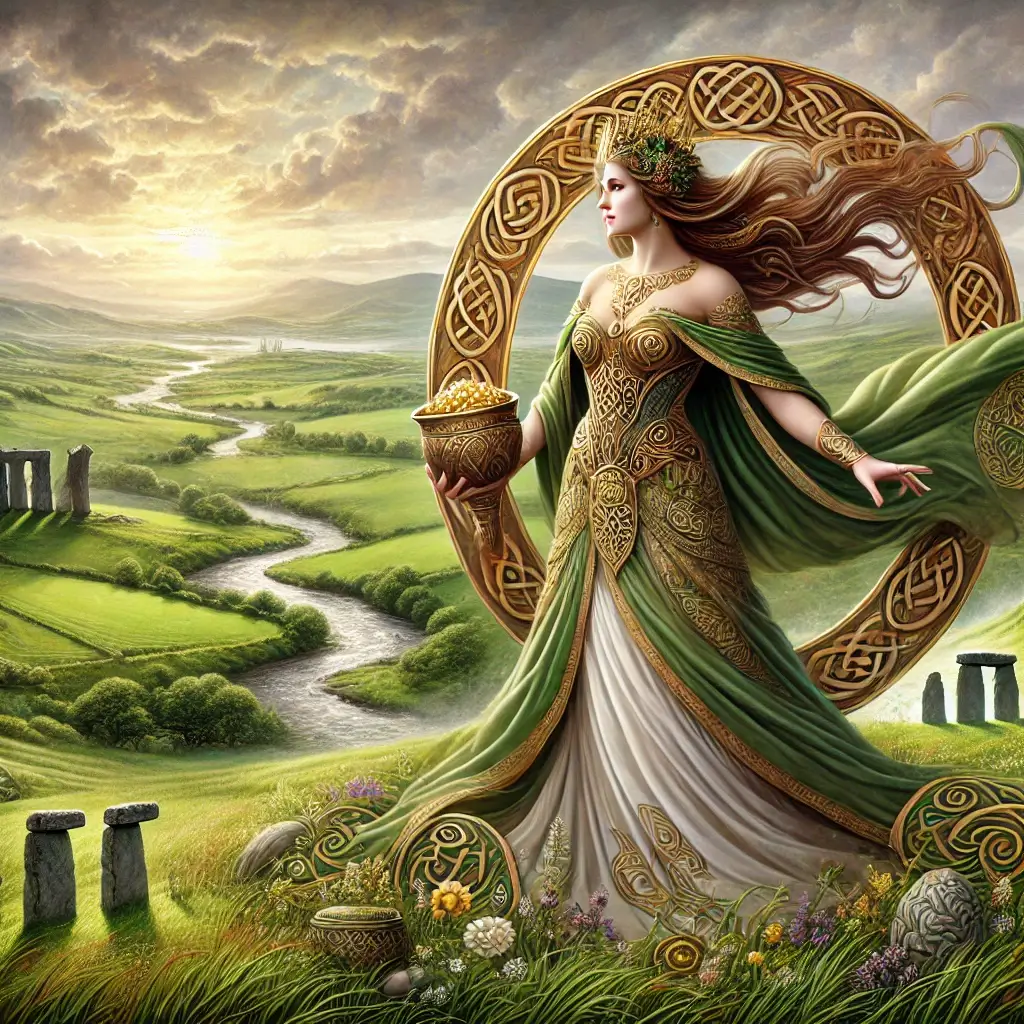No products in the cart.

The Celtic Goddess Ériu is one of the most significant figures in Irish mythology and Celtic deities and she embodies the essence of the land and sovereignty of Ireland. Her name is the source of Éire, the Irish name for Ireland, cementing her legacy as the personification of the island itself. As a goddess of land, Ériu represents fertility, abundance, and the sacred connection between the land and its people, playing a vital role in the myths that define Irish identity.

Ériu, pronounced “AIR-yoo”, is one of three sister goddesses, along with Banba and Fódla, who together represent the spirit of Ireland. These goddesses, often referred to as Ireland’s protectors, are deeply associated with sovereignty and the natural world. The sisters were said to embody the land in its entirety — its hills, rivers, forests, and fertile plains — and were believed to bestow kingship upon rulers who upheld justice and honour.
In the tale of the Milesians, mortal invaders seeking to claim the land from the Tuatha Dé Danann, the sisters greeted the newcomers. While all three sisters are significant, Ériu emerged as the most honoured, as the Milesians chose her name to represent the land. This decision signifies her primacy as the guardian and embodiment of Ireland.
As the Ériu Irish goddess, she serves not just as a deity of land but also as a symbol of prosperity and renewal, reflecting the cycles of nature that sustain life.

Ériu’s prominence is most evident in the Lebor Gabála Érenn (The Book of Invasions), an ancient text chronicling Ireland’s mythological history. In this tale, Ériu and her sisters meet the Milesians, the last invaders of Ireland. Each sister offers blessings and challenges to the newcomers, but Ériu’s encounter is particularly impactful. She proclaims her vision for Ireland as a land of wealth, strength, and unity, inspiring the Milesians to choose her name for their new home.
Ériu is often portrayed as a goddess tied to sovereignty, a concept central to Celtic kingship. In Celtic belief, the health of the land was intrinsically connected to the moral and spiritual alignment of the ruler. As a goddess of land and fertility, Ériu symbolised this sacred bond, ensuring the land’s prosperity under just leadership.

The Ériu goddess symbol is inherently tied to the land and its natural features. While there is no singular iconography for Ériu, her presence is evoked through imagery of Ireland’s lush and abundant landscapes. Fertile plains, rolling green hills, and flowing rivers all serve as representations of her divine essence.
In some interpretations, Ériu is depicted holding a cornucopia, a symbol of plenty, or standing amidst Celtic knotwork patterns that reflect the interconnectedness of land, people, and spirit. Additionally, sacred sites in Ireland, such as the Hill of Tara, have strong associations with Ériu, as they were centres of kingship rituals and believed to be places of communion with the goddess of the land.
Ériu’s role as a goddess of sovereignty underscores her importance in Irish mythology. The Celtic worldview held that the land itself was a living entity, and the ruler’s legitimacy came from their alignment with the goddess who personified it. By granting sovereignty, Ériu ensured that the ruler served the land and its people justly. If the ruler failed in their duties, it was believed that the land’s fertility and abundance would diminish as a sign of divine displeasure.
Ériu’s mythology serves as a reminder of the Celtic belief in the reciprocal relationship between nature and humanity. Her story highlights the sacred responsibility of leadership to maintain harmony with the natural world.

Ériu’s influence endures through the name Éire, which continues to be used as the official Irish name for Ireland. Her legacy as a protector and personification of the land resonates deeply in Irish culture, serving as a symbol of national identity and pride.
Artists, poets, and scholars have drawn inspiration from Ériu’s mythology, portraying her as a timeless figure who embodies Ireland’s beauty and resilience. In modern times, she is celebrated in festivals and through artistic representations that honour her role as a guardian of the land.
As the Irish goddess Ériu, she embodies the soul of Ireland itself. Her name, tied to the very identity of the nation, reflects her enduring influence as a symbol of fertility, sovereignty, and natural beauty. Through her mythology, Ériu offers a profound reminder of the sacred bond between humanity and the land, a relationship that remains at the heart of Celtic spirituality and Irish heritage.
















